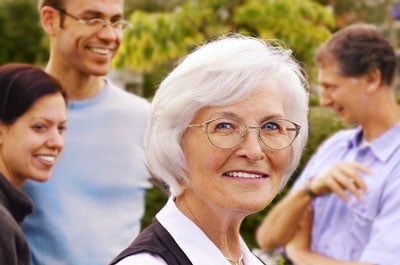 As your parents or older family members age, they may not eat as healthily as they once did. Some issues that affect older people, such as frailty or depression, may make it either difficult to plan and prepare meals or difficult to summon the energy. All too many older people make do with less than nutritious meals.
As your parents or older family members age, they may not eat as healthily as they once did. Some issues that affect older people, such as frailty or depression, may make it either difficult to plan and prepare meals or difficult to summon the energy. All too many older people make do with less than nutritious meals.
Many older Americans are food insecure, which can stem from multiple factors, including difficulty accessing healthful and inexpensive food or challenges in paying for an adequate amount of food. In addition, if they are living alone, they may lack the motivation to cook for themselves.
Coupled with these challenges, though, is the importance of eating well to senior health overall. Eating healthily can keep in check health conditions common to the elderly, like diabetes and heart disease. It can improve the overall energy level of seniors and keep their brain functioning optimally. Good nutrition has a preventive effect on illnesses as well. In short, healthy eating is part of good senior care.
A New Plan for Seniors
Eating healthily is important enough for seniors that the U.S. government has recently rolled out a plan specifically for them. It's called MyPlate for Older Adults. It is based on the government's 2015-2020 Dietary Guidelines for Americans. (It follows the "plate" method, in which the U.S. dietary guidelines for health are represented visually as one plate, with the percentages per day represented by how much room they take up on the plate.)
The biggest part of the plate? Fruits and vegetables! We all know that fruits and vegetables are #1 for health. For seniors, 50% of their daily intake should be centered on fruits and vegetables.
It's important to know, too, that older people should be focusing on fruits and vegetables that have darker flesh. In other words, spinach rather than iceberg lettuce. Sweet potatoes over the regular kind. They are higher in nutrients. Berries, also, are particularly good for brain function.
Other important nutrition considerations include protein and iron. Lean red meat can be a healthy food choice. In addition, dairy products are important to retain good calcium levels: Good calcium = Good bones.
Changes as People Age
There are several changes as people age that can affect healthy eating. First, taste buds may not be as sensitive as when they were younger, or their tastes may change. Some older people respond by dumping on salt to make food more flavorful.
More salt is definitely not to be encouraged. It's bad for heart health. Instead, older people should be encouraged to experiment with herbs and spices to make food enticing.
Second, although people need good nutrition as they age, they need less calories. As metabolism slows, calorie requirements drop several hundred calories per day or more as we age. Whereas a young woman or young man needs 1,800-2,200 and 2,200-3,200 calories per day, respectively, their senior counterparts might need 1,600-2,200 and 2,000-2,800 calories per day, respectively.
Essentially, seniors need to eat better, but eat less. Otherwise, pounds might creep on, and that's bad for health and mobility as well.

How to Ensure Healthy Eating
If you are concerned that an older parent or family member is not eating enough, not eating healthily, or is having difficulty preparing food due to health or other conditions, we can help. We set up a care plan specifically targeted to your needs. Our in-home care givers are experienced in senior care. They can prepare meals and perform other tasks to ensure that healthy eating is part of your loved one's life.
Please contact us to discuss how we can assist you and your older parent or family member. We are here to help.

